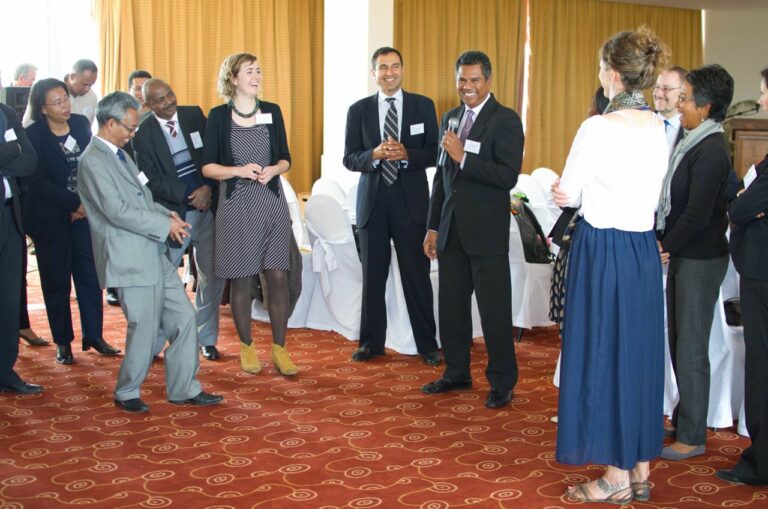A landmark meeting held in Antananarivo this week brought together health and conservation organisations, international donors and government ministers to discuss their shared vision for Madagascar’s sustainable development.
The meeting called for more widespread adoption of an integrated approach known as ‘Population-Health-Environment’ (PHE), which combines health education and voluntary family planning services with natural resource management and biodiversity conservation initiatives.
The meeting was convened in order to share experiences of PHE in Madagascar, and to support greater uptake of this powerful way of jointly addressing some of the country’s most pressing social and environmental challenges. It increased dialogue between different actors, and led to a solid consensus to form a national PHE network for enabling organisations to continue sharing learning and working together to implement PHE in Madagascar.
The network will facilitate communications and partnerships between conservation and health actors, establish an online information portal, provide technical assistance, engage with donors and policy makers, and support organisations to demonstrate the impact of the integrated work that they are doing.
PHE is an obvious ‘win-win’ approach for conservation and health organisations as it addresses threats to ecosystems in a holistic way, while ensuring that some of the most remote and under-served communities have access to vital health services.
Amelia Yeo, Project Coordinator for Marie Stopes Madagascar, remarked: “It’s very exciting to think of partnering with conservation organisations because integrating our services into different models will help us get to those people who aren’t currently able to access the services they need, and enable them to make choices about their reproductive health.”
The interdisciplinary PHE model improves human and ecosystem health by empowering couples to plan and better provide for their families, invest in their children’s education, improve their livelihoods, and take an active role in the management of their natural resources and the protection of their environment.
Zo Zatovonirina, Social Outreach Coordinator for Conservation International, noted: “It’s important to remember that natural resource management is linked directly to the health of ecosystems, which in turn ensures the health and well-being of communities.”
The creation of this national PHE network comes at a time when Madagascar’s new government is preparing to outline its sustainable development priorities, and as the United Nations is redefining our collective vision for global development post-2015.
“This is the first time that I’ve seen so many partnerships between organisations working towards the same outcome,” said Dr Voahirana Ramiaramananarisoa from the Ministry of Public Health.
- The meeting was organised by Blue Ventures and Voahary Salama under the patronage of his Excellency the Prime Minister of Madagascar and Minister of Health, Dr Roger Kolo, and the Minister of Environment, Ecology and Forests, Anthelme Ramparany.
- Other ministries in attendance included: Ministry of Population, Social Protection and Promotion of Women; Ministry of Agriculture and Rural Development; Ministry of Water. Donors in attendance included: the Helmsley Charitable Trust; the MacArthur Foundation; USAID Madagascar; UNFPA Madagascar.
- NGOs in attendance included: Conservation International (CI), World Wide Fund for Nature (WWF), Wildlife Conservation Society (WCS), Durrell Wildlife Conservation Trust, Duke Lemur Center, Missouri Botanical Gardens, Azafady, Marie Stopes Madagascar (MSM) and Population Services International (PSI).
Madagascar is a global biodiversity hotspot, with 80 per cent of its plants and animals found nowhere else on earth. Despite its ecological riches, 92 per cent of its population live on less than $2 per day, and it has been ranked among the top three most vulnerable countries in the world to climate change. As much as half of the island’s most easily identified ‘primary’ forest has been converted to other land cover since 1950, and food insecurity affects almost two-thirds of the population. Over 750,000 women have unmet family planning needs, and the island’s population is predicted to double between now and 2040.
Blue Ventures is a marine conservation organisation that recognises the links between poor health, unmet family planning needs, gender inequality, food insecurity and environmental degradation. As a holistic response to these interconnected challenges, they have developed an award-winning PHE programme combining reproductive health services with marine conservation, sustainable fisheries and coastal livelihood initiatives in Madagascar.
Voahary Salama is a platform of Malagasy associations and non-governmental organisations working on integrated PHE programmes in Madagascar. Its members work throughout the country on initiatives ranging from water and sanitation to nutrition, education and environmental protection. Voahary Salama also works closely with government partners in order to promote the inclusion of this holistic approach in national policy.























